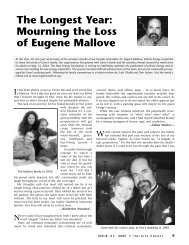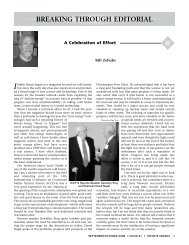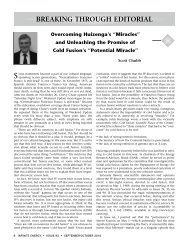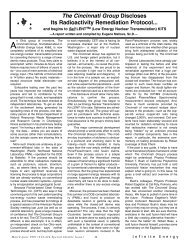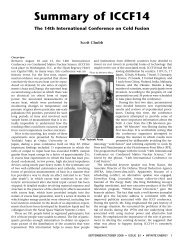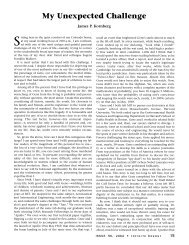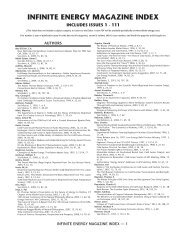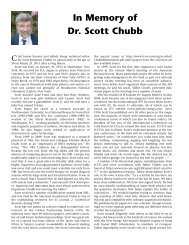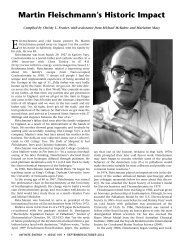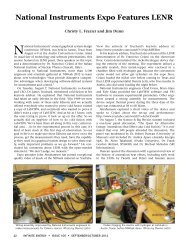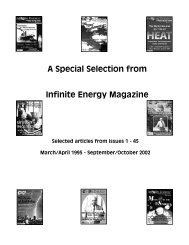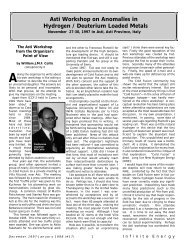MIT and Cold Fusion: A Special Report - Infinite Energy Magazine
MIT and Cold Fusion: A Special Report - Infinite Energy Magazine
MIT and Cold Fusion: A Special Report - Infinite Energy Magazine
You also want an ePaper? Increase the reach of your titles
YUMPU automatically turns print PDFs into web optimized ePapers that Google loves.
<strong>MIT</strong>, along with all other universities that I know anything about,<br />
does not often intrude between its faculty members <strong>and</strong> their professional<br />
actions as scientists. We don't, for example, review the manuscripts<br />
of our faculty prior to publication, as do many corporations <strong>and</strong><br />
government organizations. We are used to a high level of controversy,<br />
often between members of our own faculty. Disputes about scientific<br />
data, methods <strong>and</strong> results are common <strong>and</strong> play a positive role in<br />
advancing science. When <strong>MIT</strong> faculty take public positions as scientists<br />
or citizens, it is assumed that they are acting as individuals <strong>and</strong> not as<br />
official spokesman for the institution.<br />
Criteria for institutional involvement in such matters derive from our<br />
contractual <strong>and</strong> institutional responsibilities. Alleged violations of institutional<br />
policies by members of our community will bring forth an institutional<br />
response. As you undoubtedly know, at our request Prof. Philip<br />
Morrison undertook a detailed examination of the issues raised by two<br />
individuals concerning the manuscript in question <strong>and</strong> determined that<br />
there was no tangible basis for further institutional action.<br />
I hope that the various groups on our campus who are involved in<br />
this research will continue to have collegial, scientific dialogues but I<br />
see no basis to direct any of the groups to take specific actions.<br />
Sincerely,<br />
Sheila Widnall<br />
Associate Provost <strong>and</strong><br />
Abby Rockefeller Mauze Professor of<br />
Aeronautics <strong>and</strong> Astronautics<br />
Exhibit Z-10<br />
Dr. Charles McCutchen’s Letter to Eugene Mallove<br />
August 18, 1992<br />
Eugene F. Mallove, Bow, NH<br />
Dear Dr. Mallove,<br />
As you can see from the enclosures, I did not get far with Sheila Widnall.<br />
I was surprised she did not respond to my point that Philip Morrison,<br />
their own expert, had been misled by the paper. I had previously<br />
been surprised when Stanley Luckhardt irritatedly refused to consider<br />
publishing a full description of the way the experimenters interpreted<br />
their calorimetry experiment. I thought this would be a good way to<br />
remove some confusion <strong>and</strong> lower the anger level.<br />
How about taking the advice Dr. Widnall offered in her letter of April<br />
2, 1992, <strong>and</strong> submitting a letter to Journal of <strong>Fusion</strong> <strong>Energy</strong>. You might get<br />
your points out ln the open for the experimenters to answer. Perhaps<br />
the hot fusioneers will stop the Journal from publishing your letter. This<br />
would be objective evidence that they are brass-knuckle types, evidence<br />
you could take to Sheila Widnall to show what happens when one tries<br />
to have an “open debate in the scientific literature, through peer<br />
review,” with <strong>MIT</strong> scientists.<br />
Sincerely yours, Charles W. McCutchen<br />
Exhibit Z-11<br />
Dr. Charles McCutchen’s Letter to Prof. Sheila Widnall<br />
August 18, 1992<br />
Dr. McCutchen’s final word to Provost Widnall fell on deaf<br />
ears.—EFM<br />
Sheila E. Widnall, Associate Provost<br />
Massachusetts Institute of Technology, Room 3-234<br />
Dear Dr. Widnall,<br />
Thank you for your letter of Aug. 3, 1992. I do not envy you in having<br />
to deal with matters that take time away from the constructive business<br />
of the university. But consider, it is the enforcement of decency<br />
among scientists that makes collegiality possible. Without sanctions for<br />
bad behavior, science becomes a jungle. Like it or not, you knuckle-rappers<br />
are keepers of the flame.<br />
<strong>MIT</strong> is using formal procedures to evade responsibility. You <strong>and</strong> I<br />
agree, I think, that bad scientific ethics are a university's business. So far,<br />
so good. But <strong>MIT</strong> thinks that getting Philip Morrison to give the matter<br />
a once-over-lightly discharges its responsibility. (Substitute '”Eisen” for<br />
“Morrison” <strong>and</strong> you have the beginning of the Baltimore affair.) I<br />
explained that Morrison was misled by the inaccurate description of the<br />
experiment, the very thing that I object to. That he was thus misled<br />
shows that a correction should be published. You did not respond. This<br />
is stonewalling.<br />
Collegial mechanisms will not resolve the issue. They work when all<br />
parties play fair. The <strong>MIT</strong> hot fusion people are not playing fair. They<br />
published a misleading description of an experiment. The errors ln the<br />
description were important. The collegial rules require that they publish<br />
a clarification. They refuse to do so.<br />
What can the cold fusion people do now? If they submit a complaining<br />
letter to the journal that carried the original paper, the hot fusion<br />
people will probably try to prevent it from being published, <strong>and</strong> likely<br />
succeed. There will be more anger on both sides, <strong>and</strong> a lot less collegiality—all<br />
because <strong>MIT</strong> management cannot bring itself to make the<br />
hot fusion people, its own employees, behave like gentlemen. (Remember<br />
that what they refuse to publish is their own, verbal description of<br />
the way the major part of the experiment worked.)<br />
I am sorry that <strong>MIT</strong> continues to tough it out. Apparently<br />
the university feels it need not be fair to cold fusion people.<br />
Perhaps it is afraid to be fair. Luckhardt’s negative response<br />
to my proposal that a correction be published suggests that<br />
hot fusion patriotism requires one to be unfair to cold fusion<br />
people. Why else (unless there is real data faking that they are<br />
trying to hide) will the hot fusion people not publish a correction<br />
that would blunt some of the<br />
Photo: Courtesy CIA<br />
anger, <strong>and</strong> enhance their own reputation<br />
for honesty?<br />
Sincerely yours, Charles W.<br />
McCutchen<br />
“<strong>MIT</strong> Professor<br />
Has a Theory<br />
to Explain ‘<strong>Cold</strong> <strong>Fusion</strong>’”<br />
<strong>MIT</strong> Provost John Deutch said, “<strong>MIT</strong> is a place where creative<br />
individuals are encouraged to address scientific subjects of<br />
the greatest significance. We are pleased to see Professor<br />
Hagelstein proposing an explanation for ‘cold fusion’ <strong>and</strong> we<br />
are encouraging investigators both here <strong>and</strong> at other research<br />
institutions to continue their work on this most surprising<br />
phenomenon, which may have enormous consequences.”<br />
[Later, Dr. Deutch became Director of the CIA in the Clinton<br />
cc: Dr. Eugene F. Mallove<br />
Press Release<br />
<strong>MIT</strong> News Office<br />
April 12, 1989<br />
Ponder the unthinkable. Question the status quo. Live in the world as<br />
well as in your own nation. Dream of a better future, but<br />
contribute to the present. Share your talents. Commune with all people.<br />
Be steady friends <strong>and</strong> bold companions. Be honest in all that you do.<br />
—<strong>MIT</strong> President Charles Vest’s Commencement Address June, 1998.<br />
56 <strong>Infinite</strong> <strong>Energy</strong> • ISSUE 24, 1999 • <strong>MIT</strong> <strong>Special</strong> <strong>Report</strong>



